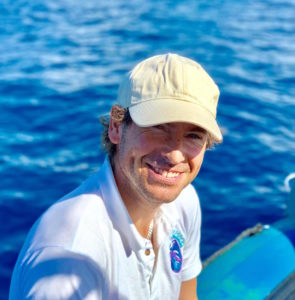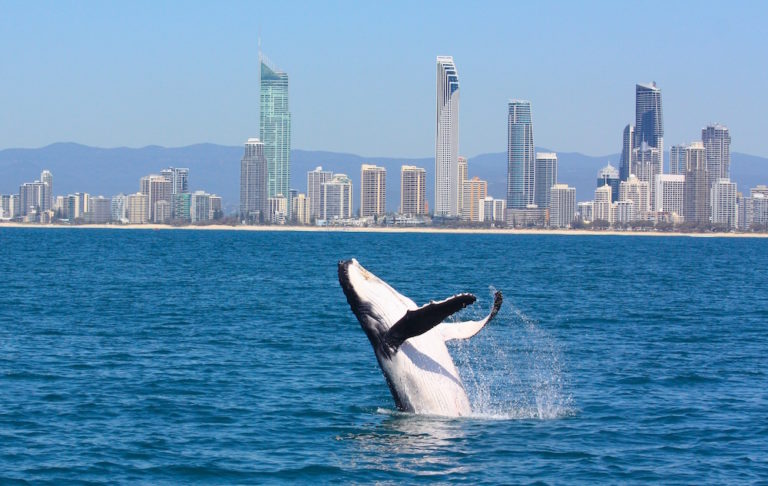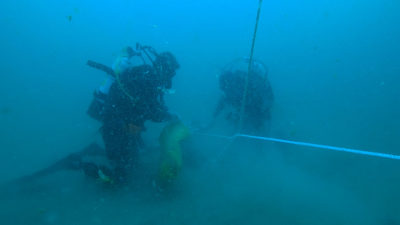The Griffith University whale researcher reflects on a time when our oceans were filled with gentle giants
A respected marine biologist, Dr Jan-Olaf Meynecke is a Research Fellow with the Coastal and Marine Research Centre and co-founder of Humpbacks & High-rises—a not-for-profit research organisation dedicated to urban marine mammal research and protection.
‘The ultimate aim is to actually have sustainable interaction with these animals so that we can share this place with them for the next 100, 200 or more years,’ says the Gold Coast-based academic.
‘It’s always a mixture between going out in the field a little bit and then study what we’ve found back in the office or back in the lab. When we’re out in the field we study basically the behaviour of the animals, whether the current population is starting to suffer from infections. The other part is the areas they need … for a successful migration.’
Dr Meynecke’s research expertise is in ecology of coastal marine environments, seascape connectivity, ocean dynamics and marine mammal response.

What led you to marine biology?
Mostly all the pets and animals I had the pleasure to share my childhood with. To be fair, I wasn’t playing with whales or manta rays but it was the time when my passion and love for all animals developed. And to this very day I feel a deep connection to all life on earth: sea or land animal. My favourite subjects at school were biology, earth science and chemistry. I studied Environmental Science and then came over to Australia from Germany to do my PhD in Marine Ecology with Griffith University. I was interested in how climate change and habitat change would influence marine life.
Why did you choose to work at Griffith University?
Griffith University was conveniently located, with its Gold Coast campus in close range to the ocean. It is a dynamic and innovative university where I could see my opportunity to develop something new and create far-reaching research outcomes. It also helped that I had two scholarships for my PhD studies through Griffith.
What do you consider your greatest achievement?
So far I consider the establishment of citizen science in the south-east Queensland whale watch industry my biggest achievement. When I set up the NGO Humpbacks & High-rises on the Gold Coast there was very little research done, if any, on whale watch boats. Today we have trained volunteers from Byron Bay to the Sunshine Coast contributing to the research and protection of marine mammals through the support of whale watch operators. This has led to a number of other achievements such as the recognition of the Gold Coast bay as a Hope Spot under Mission Blue. [Hope Spots are ecologically unique areas of the ocean designated for protection under a global conservation campaign overseen by Mission Blue, a non-profit organisation].

What would your superpower be, if you could have one?
I should say to breathe like a fish, given my background and my desire to spend endless time exploring the ocean. However, elemental control (fire, water, earth) would not only be the most powerful superpower but also allow me to control water. Sounds tempting.
Which person do you most admire (living or dead)?
There are a few of course, however, [Mission Blue founder] Dr Sylvia Earle is certainly amongst them. She has stood up for marine protection for many decades and created an extraordinary movement to help our oceans. Most of all she kept her positive energy and her passion and shares it with everyone. For that I admire her.
What is your most treasured possession?
An opal that was given to me by a German friend in Australia when I first came to visit this country.
What is your favourite book and why?
Deep by James Nestor. He combines the myth of the ocean, free diving and marine science with an inspiring narration about our connection to water and the ocean.
If you could go back in time, where would you go?
Back to 2019 to stop 2020. But more seriously, I d like to go back to a time before whaling began and experience the ocean when it was filled with millions of whales.
What has 2020 taught you?
Being resilient and dealing with sudden changes. A lot if not all plans I made for 2020 had to be changed, shifted or cancelled. Plans can be changed and adjusted but what is more important than anything is health.



